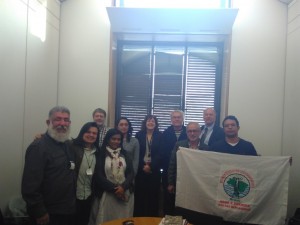The All-Party Parliamentary Human Rights Group (PHRG) met with Human Rights Defenders (HRDs) from Colombia, Brazil and the US, on 17 October, to discuss the impacts of mining projects in their local communities, before their attendance at the BHP Billiton Plc AGM in London.
The speakers were:
- Angelica Ortiz – Fuerza de Mujeres Wayuu, La Guajira, Colombia (AO);
- Luisa Rodriguez – CINEP, Centre for Popular Education and Research, Bogota, Colombia (LR);
- Rodrigo Peret – OFM, Churches and Mining Network, Minas Gerais State, Brazil (RP);
- Thiago Alves da Silva – MAB, Movement of People Affected by Dams, Minas Gerais, Brazil (TAdS).
- Roger Featherstone (Arizona Mining Reform Coalition), Arizona, USA (RF);
- Roy Chaves – Retired Miners and Concerned Citizens, Arizona, USA (RC);
The main points which arose were as follows:
- The Samarco mining disaster in Brazil in November 2015, when 50 million cubic metres of tailings (fine post-processing wastes) flooded out of the Samarco dam, killed 20 people. Samarco is 50% owned by BHP Billiton and 50% by Brazilian mining company Vale. Since the disaster, the community feels the situation has been aggravated by the attitude of the companies involved about reparations owed to the community. Two years after the disaster, fines of $47 billion originally demanded have not been paid; and, there has not been a comprehensive study of the effects of the mining disaster, which caused mud flows of 8 meters high and over a large area. It would be useful to have the UK put pressure on BHP to do what is necessary to provide effective remedies and adequate compensation. (RP)
- Some people affected by the Samarco disaster are still living in rented houses and on the minimum Brazilian salary. Families of those affected must prove they have suffered harm and begin a complex process. Companies try to deal with individuals rather than consult with the community in attempt to divide the latter. (RP)
- HRDs and environmental HRDs are being threatened and assassinated in Colombia. It is estimated that 34 HRDs have been assassinated between December 2016 and now. (AO)
- There is a general narrative that suggests indigenous peoples are opposed to development, which is used by the Colombian President. This is untrue; they are against environmental damage and repeated displacement. (AO)
- HRDs in Brazil are also being threatened.
- There is a lack of transparency in Colombia regarding air and water pollution, for example in the region of La Guajira where the Cerrejon coal mining company (owned by Anglo-American, BHP and Glencore) operates. There should be community involvement in processes to measure and control such pollution, and also in resettlement processes. (LR)
- There have been many sentences passed by different courts in Colombia against mining companies, such as the 2016 Constitutional Court decision for the provision of drinking water to two villages, but companies often do not comply with these rulings. Some cases involve a lack of access to drinking water and the contamination of water with heavy metals that affects skin and results in gastro-intestinal problems. (AO)
- Forced evictions and threats of forced evictions continue in Colombia, with the most recent case happening 15 days ago involving a member of the African-descendant community. (LR & AO) Disproportionate force is often used in forced evictions. (AO)
- Rio Tinto and BHP are involved in a joint venture for a block-caving copper mine (which by its very nature is very destructive) which would destroy Oak Flat, Arizona, though it is becoming increasingly apparent that the tailings dump location is unsuitable. (RF)
- Local communities in the town of Superior, US, feel they will not be getting their fair share out of mining operations in the area, and will face negative environmental impacts caused by the mining. The voices of the Apache community in the area also need to be heard as they have rights over the area. (RC)
- It is a bad reflection on the UK to allow UK companies to carry out activities which impact so negatively on local communities. (RC)
- Mining companies in Colombia are strategic and comply with international trading rules, but not with human rights obligations or regulations in respect of contamination. They adhere to Colombian norms, which are often flexible, instead of to the minimum and more robust international standard. 46% of Colombian coal is exported to Europe from Colombia, with the owners of mining companies also often located in Europe. (LR)
- The UK should be more supportive of a binding treaty on transnational corporations, rather than voluntary principles. (RP)
 The PHRG will continue to monitor the situations closely and to raise its concerns, including the protection needs of HRDs and communities opposing the negative impacts of mining operations, with relevant interlocutors.
The PHRG will continue to monitor the situations closely and to raise its concerns, including the protection needs of HRDs and communities opposing the negative impacts of mining operations, with relevant interlocutors.

